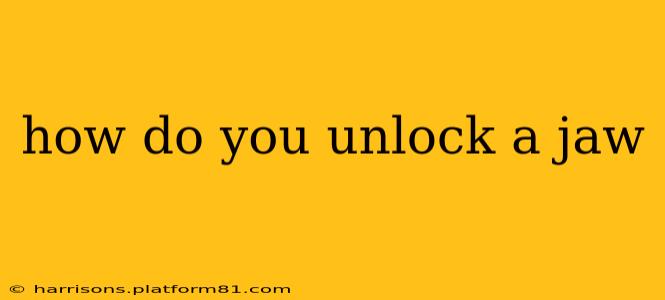A "locked jaw," or more accurately, temporomandibular joint (TMJ) dysfunction, is a frustrating condition that can severely limit your ability to open your mouth. It's not about literally unlocking a jaw in the sense of a physical lock, but rather resolving the underlying issue causing the restricted movement. This can stem from a variety of causes, and addressing it requires understanding the potential culprits.
What Causes a Locked Jaw?
Several factors can contribute to a locked or stiff jaw:
-
Temporomandibular Joint Disorders (TMJD): This is the most common cause. TMJD encompasses a range of conditions affecting the TMJ, the joint connecting your jawbone to your skull. These disorders can involve inflammation, misalignment, or damage to the joint's cartilage and ligaments.
-
Muscle Spasms: The muscles controlling jaw movement can spasm, leading to severe pain and limited range of motion. This often results from stress, bruxism (teeth grinding or clenching), or injury.
-
Dislocation: In rare cases, the jaw can dislocate, meaning the joint comes completely out of its socket. This typically requires immediate medical attention.
-
Trauma: An injury to the jaw, such as a blow to the face, can cause a locked jaw.
-
Arthritis: Conditions like osteoarthritis or rheumatoid arthritis can affect the TMJ, leading to pain, stiffness, and limited movement.
-
Infections: Infections in or around the TMJ can also cause pain and restricted movement.
How Can I Fix a Locked Jaw? (Self-Care and When to See a Doctor)
While some minor jaw stiffness might resolve on its own, persistent or severe locking requires professional attention. Here's a breakdown:
Home Remedies (for mild cases ONLY):
-
Gentle Stretching: Perform gentle jaw stretches under the guidance of a healthcare professional. Improper stretching can worsen the condition.
-
Heat and Ice Packs: Applying warm or cool compresses to the affected area can help reduce pain and inflammation. Alternate between the two.
-
Over-the-Counter Pain Relievers: Nonsteroidal anti-inflammatory drugs (NSAIDs) like ibuprofen can help manage pain and inflammation. Always follow dosage instructions.
-
Soft Food Diet: Avoid foods that require excessive jaw movement while your jaw is stiff or painful.
When to Seek Medical Attention:
You should see a doctor or dentist immediately if:
- Your jaw is severely locked or painful.
- You experience significant swelling or bruising.
- You suspect a dislocation.
- You have difficulty breathing or swallowing.
- The condition doesn't improve after a few days of home care.
What Kind of Doctor Treats a Locked Jaw?
Several healthcare professionals can help diagnose and treat a locked jaw:
-
Dentist: Dentists specializing in TMJ disorders (often called TMJ specialists or orofacial pain specialists) are frequently the first point of contact.
-
Oral and Maxillofacial Surgeon: For more complex cases or surgical interventions.
-
Physician (MD or DO): May be involved in managing associated pain or other medical conditions.
-
Physical Therapist: Can teach you exercises to improve jaw mobility and strength.
What Treatments are Available for a Locked Jaw?
Treatment depends on the underlying cause and severity:
- Medication: Pain relievers, muscle relaxants, and anti-inflammatory drugs.
- Splints or Mouthguards: Worn at night to prevent teeth grinding and protect the joint.
- Physical Therapy: Exercises to improve jaw mobility and strength.
- Injections: Corticosteroid injections can reduce inflammation.
- Surgery: In rare, severe cases, surgery may be necessary.
Remember, attempting to "unlock" your jaw yourself without professional guidance is risky and could cause further damage. Always consult a healthcare professional for diagnosis and treatment. They can assess your condition accurately and create a personalized treatment plan to alleviate your pain and restore normal jaw function.
